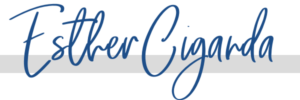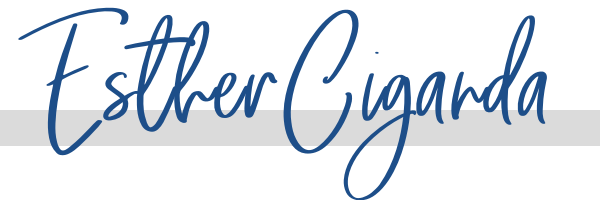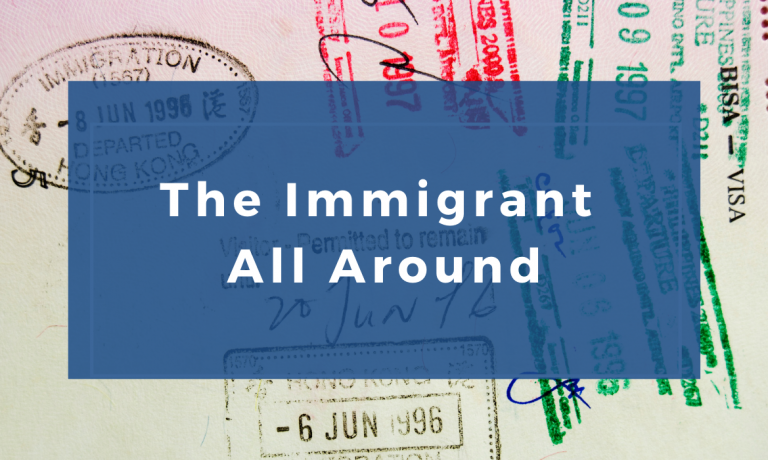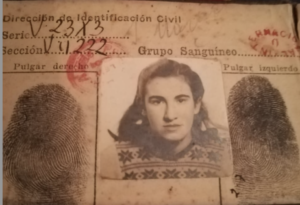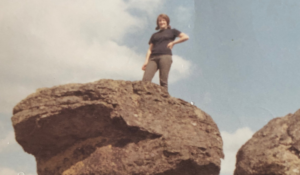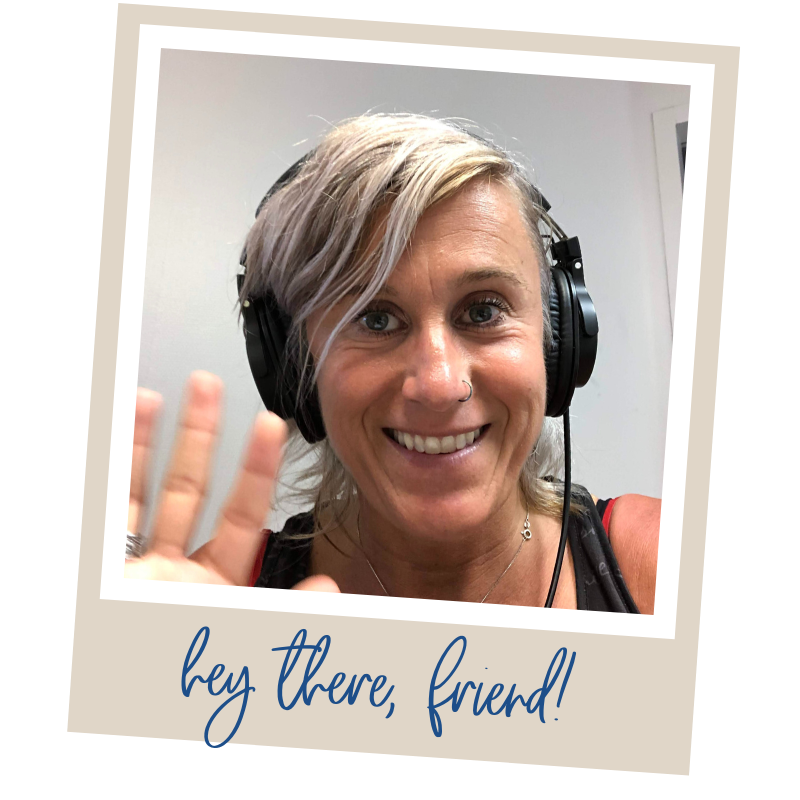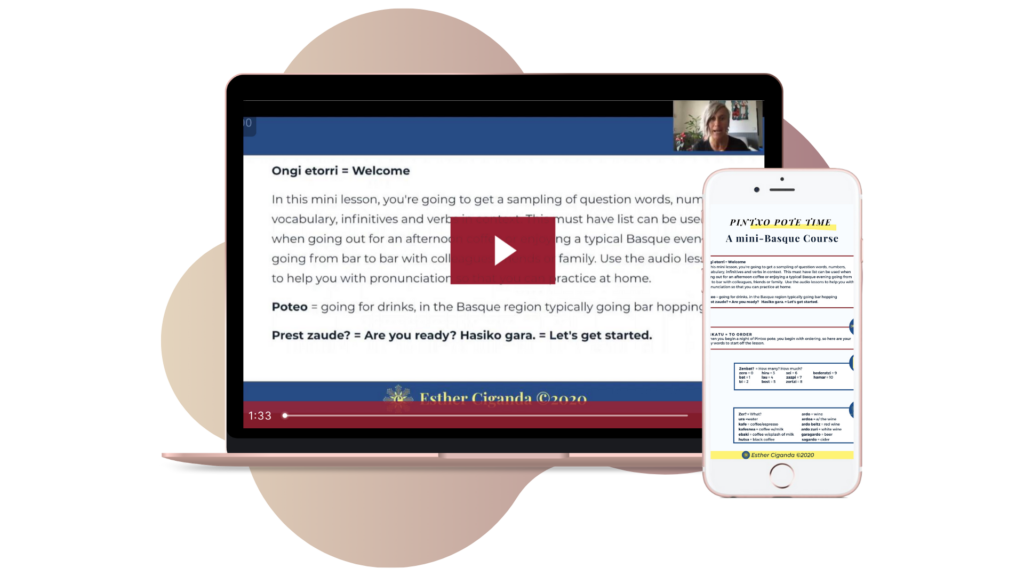In the intro episode to The Immigrant All Around hear me, the host, tell about why I wanted to create a podcast to showcase the stories of immigrants around the world. I briefly share my story as a daughter of immigrants and what has inspired me to be the person that I am today.
Daughter of Immigrants and my languages

I briefly mention how I learned Spanish first at home and then English at school. Later I’d travel to the Basque Country in order to learn my heritage language. When I moved to France in 2014, I knew I needed to learn French.
Inspiring Stories
Hit subscribe to never miss the inspiring & entertaining stories told by people all around the world.
Important Links
Interested in learning Basque? Grab the mini-course today: https://basquewithesther.com
Esther describes herself as being multi-passionate. Check her out on Instagram on the following accounts:
https://www.instagram.com/basqueinlanguages/
https://www.instagram.com/esther.ciganda/
Follow The Immigrant All Around podcast:
https://www.instagram.com/theimmigrantallaround/
https://www.facebook.com/The-Immigrant-All-Around-105426668153656
Support the Podcast:
It takes a lot of time to record, to edit, to upload, to write the blog post, to prepare the transcripts, and to promote the podcast. For me, it’s a pleasure to get to talk to everyone and to produce the podcast for you.
If you wanna buy me a ☕, head to 👇🏽
https://basquewithesther.comcoffee
Want to get the transcript of today’s episode? Read it down below.
[00:00:05.275] - Esther Ciganda
Kaixo! Ongi etorri, bienvenidos and welcome to The Immigrant All Around with your host, Esther Ciganda. Kaixo, Kaixo, Hey, Hola, and welcome to Episode zero zero zero, the intro episode to The Immigrant all around with me. And this is the episode that I kind of tell you a little bit about what the immigrant all around podcast is going to be about and who am I and why am I call qualified to talk about the topic.
[00:00:34.835] - Esther Ciganda
So basically, my why behind this whole show began in February of twenty twenty.
[00:00:41.435] - Esther Ciganda
I was driving to work and bling right in my head. I was like, I want to do a podcast and I want to do a podcast about immigrants. You might be wondering, well, why? Well, both my parents are immigrants. I'm a proud daughter of immigrants, and I've always just enjoyed listening to the stories of different immigrants around the world. And I want to create a place to showcase the individual stories of people that have had to move to new countries by necessity or by choice.
[00:01:17.555] - Esther Ciganda
But I want them to talk about their language learning experiences.
[00:01:20.885] - Esther Ciganda
I want them to share the positives and the negatives, the wins and the losses and the life lessons that they have, you know, acquired in their own personal journeys. And I want them to share with us the listeners. So as I told you, I am the daughter of immigrants. My parents immigrated to the United States, to the state of Washington, and they came separately. They have their own unique and different stories, which I will let them tell and their own personal interviews.
[00:01:53.495] - Esther Ciganda
But being raised in the state of Washington by immigrants. You know, as a child, I knew we were different. My brother and I were different. We had a different language at home. We ate different things. We had different cultures. We had different customs. We would get together with others that were similar to us, other immigrants, and immigrants', children. And we enjoyed different things. And, you know, I had two very distinct experiences.
[00:02:24.635] - Esther Ciganda
I had my school culture, English at school, my friends at school. But I also had a different language outside of school, which was the home language, which was Spanish. And then we had all the different events and festivals.
[00:02:38.285] - Esther Ciganda
That was part of our culture. So it was an amazing upbringing and something that I still continue to this day in celebrating my culture that, you know, I inherited because of my parents that are immigrants.
[00:02:52.415] - Esther Ciganda
So born in the U.S., my first language is Spanish.
[00:02:56.675] - Esther Ciganda
I started learning English when I was in, you know, around 5th when I was five years old. And sure, I was exposed to it before that. But officially, I didn't start learning it until I was five, so. You know, I don't recall any struggles, I remember there were report cards that used to say I used to struggle with learning a language, but, you know, I can't you know, little kids are sponges.
[00:03:20.695] - Esther Ciganda
So I learned right away, didn't have any difficulties. I was mainstreamed. There was no ESL classes that I know of. So, you know, I transitioned quickly. We also had a third language at home that my mother did not speak, but my dad did know which was the Basque language. And I was also very passionate about learning this heritage language of mine. And I was able to fulfill that dream of mine in 2011 when I went to a Barnetegui, which is a Basque school, which is full immersion, and I did that in the Basque country.
[00:03:55.075] - Esther Ciganda
And now I'm proud enough to say that I am a Euskaldun berri, which is a new Basque learner, and I'm able to speak and converse with anyone in the Basque country or in different Basque communities in the Basque diaspora.
[00:04:07.375] - Esther Ciganda
My fourth language is French, which I learned as being an immigrant myself. I immigrated to France six years ago and I did that by choice. It was a by necessity. I wanted to go on the adventure to the area where my parents came from wasn't the exact area, but. Being raised on a farm, which you'll hear in a second, I wanted to live near the ocean, so that's why I chose the area where I'm at and I found a place to live in France.
[00:04:34.065] - Esther Ciganda
So that's where I ended up living, didn't know the language. So I knew I was going to be different. And I also didn't have a French passport.
[00:04:42.135] - Esther Ciganda
I had a Spanish passport. So I had to figure out like, oh, I am going to have to do a lot to make sure that I was doing things legally. So quite an adventure for myself, but very different than when you're doing it by choice, then when you're doing it by necessity. I'm also a veteran teacher. This is my twenty third year in the classroom. I'm a biology a biologist by trade, my degree's in biology.
[00:05:09.555] - Esther Ciganda
I also have minors in chemistry and Spanish. So I'm very multi-passionate and I've taught a lot of different things. I've taught biology. I've taught chemistry. I taught physical science. I've taught all levels of Spanish starting from Spanish one all the way through AP Spanish. I've also taught a ASB leadership, I've taught Link crew, I've been department head, I have coached all kinds of sports. I've also been a Science Olympiad coach.
[00:05:40.335] - Esther Ciganda
And now I've been living in, you know, Europe and I've been teaching English for the last six years and I've been teaching Basque online to learners all around the world. So definitely multi-passionate. And I'm an avid sports fan. Not only do I enjoy watching sports, but I love playing sports. And now I'm really active with the United States Federation of
[00:06:05.055] - Esther Ciganda
Pelota Vasca and as I said earlier, a lot of my own fulfillment in life is being raised on a farm. Like everything I've learned about life comes from that farm life. And that's something my parents do to this day. So really proud to be a daughter of immigrants and also to be a farm girl.
[00:06:24.555] - Esther Ciganda
So let's get back to the podcast. The podcast is going to focus on the stories of people who have moved to different countries.
[00:06:34.485] - Esther Ciganda
And like I said, it's going to be either focusing on those who have made the decision by choice or those who have had to move to a country by necessity, will let them tell their story.
[00:06:48.975] - Esther Ciganda
And what I'm going to be asking are different questions in relationship to like what languages have they had to learn, you know, in their move? What memories do they have of language learning? You know, like I said, me being a daughter of immigrants, I don't recall learning English at school. And I do have a memory now of having to learn French in France. But I have done that not necessarily by necessity, but more because I was challenged by the fact that someone said to me, like, how is it that you live in France and you don't speak French?
[00:07:24.045] - Esther Ciganda
And it was like, Well, because I do know Spanish, I do know English and I do know Basque. I'm able to get away with it, you know. But I took on that challenge and I am able to speak French now, probably about an A2 level, which is, you know, very basic French. But I'm able to, you know, move around and get away with doing things like donating blood, going to the dentist, using my French.
[00:07:47.775] - Esther Ciganda
So I want people to share that.
[00:07:50.265] - Esther Ciganda
Like, what have their struggles been when learning a language in a new country? I want them to talk about, like, specific experiences in their new country, you know, anything that they were willing to share with us. What life lessons have they learned? What advice or suggestions do they have to us, the listeners, about moving to a new country?
[00:08:12.645] - Esther Ciganda
So why I'm truly excited for this is not only to showcase the stories of individuals that maybe I don't know who they are yet, but I want to give a voice first to my parents. I want to document their stories. So that kind of gives light to who I am because it's thanks to them. I am the person that I am. I have learned to never be afraid.
[00:08:37.935] - Esther Ciganda
I'm not afraid to move to different places. I'm not afraid to try new things. Failure for me was never an option. I watched my parents work their butts off to succeed in a country that wasn't their own, where they didn't have the language.
[00:08:52.485] - Esther Ciganda
They had to learn everything, how to do things in a new culture, make new friends. And I saw them work their butts off not to fail. And that's the person that I am. I do not accept failure. And if I make a mistake or if I do fail, guess what? I'm going to make sure to learn from any of the mistakes that I have made, adjust and move on in order to succeed. And that's my goal, is I want to honor them.
[00:09:22.845] - Esther Ciganda
This podcast is in their honor; to my parents and also to any other immigrants who have raised children like myself in other countries that wasn't their home country, or as my dad would say, the old country. And, I really want to, you know, invite others around the world to come on to my podcast and to share their language challenges in a new country, and I hope that they accept my invitation because this podcast is for you.
[00:09:56.175] - Esther Ciganda
This is the home where I want you to share your story and I want to document that. And I guess you, the listener, if you are an immigrant and you are willing to share your story, I welcome you to, you know, sign up and fill out that podcast form to be a guest on the show. Or if you're not an immigrant but you know someone who else is invite them or better yet, if you're willing, nominate them.
[00:10:26.715] - Esther Ciganda
But please ask for their permission. So, you know, we don't get them, you know, get them by surprise in there. Like, I'm too afraid to do it. But I will make sure that this is a positive experience for them, for myself and for you.
[00:10:41.475] - Esther Ciganda
And before I end today's episode of Episode zero zero zero and I want to say thank you for showing up and listening to this episode, and I invite you to hit that subscribe button so you don't miss any of the upcoming episodes of other immigrants around the world until next time AIO. You've been listening to The Immigrant All Around podcast, the show dedicated to the immigrant stories around the world, remember to hit that subscribe button so you don't miss any of the upcoming episodes.
[00:11:17.865] - Esther Ciganda
Aio. (Bye in Basque)
Don't miss an episode!
Enter your name and email address below and I'll send you periodic updates about the podcast. Si quieres información sobre el Podcast, agrega tu nombre y email. Podcastari buruzko informazioa nahi baldin baduzu, jarri zure izena eta helbide elektronikoa.
